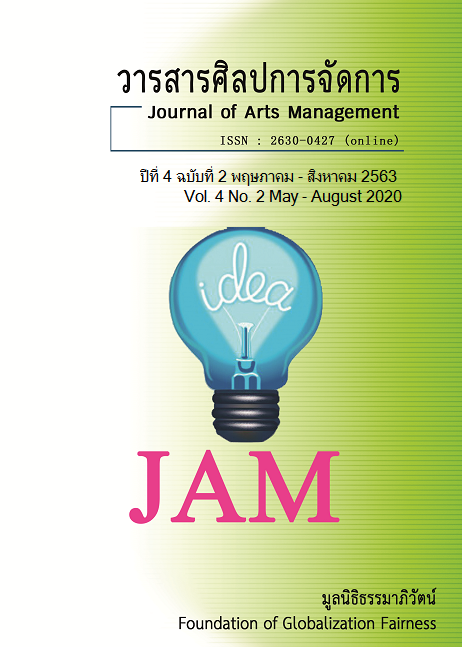A Model of Parenthood according to Buddhist Psychology
Main Article Content
Abstract
This research aimed to study (1) to study attributes and guidelines of the parents’ duties as a best practice; (2) to synthesize the Parenthood Model based on Buddhist Psychology; and 3) to examine and propose a Parenthood Model based Buddhist Psychology. The study was a mixed method using a quantitative method to extend the results to a qualitative method in nature. the instrument for collecting data was Questionnaire collecting quantitative data, and the analysis of quantitative data used a descriptive statistics, a correlation analysis by Software packages and analysis for checking the consistency of the model and empirical data by LISREL program. The research results were found as follows;
- Regarding the synthesis of the Parenthood Model based on Buddhist Psychology it found that the Parenthood Model based on Buddhist Psychology comprised 1 endogenous variable, namely, External Factors and 3 endogenous variables including 1) the 4 Divine States of Mind, 2) the 4 Paths of Accomplishment, and 3) the 4 Divine States of Mind with the 4 Paths of Accomplishment acted as the mediator variable in the model.
- While considering direct and indirect influences from the examination and proposal of a Parenthood Model based Buddhist Psychology it found that the 4 Divine States of Mind were directly influenced by External Factors with the effect size of .68 at the statistical significance of .01, the 4 Paths of Accomplishment were directly influenced by External Factors and the 4 Divine States of Mind with the effect size of .59 and .26 at the statistical significance of .01.
Article Details
Views and opinions appearing in articles in the Journal of Arts of Management It is the responsibility of the author of the article. and does not constitute the view and responsibility of the editorial team I agree that the article is copyright of the Arts and Management Journal.
References
จิราภรณ์ ตั้งกิตติภาภรณ์. (2559). จิตวิทยาบุคลิกภาพและพฤติกรรมสุขภาพ. กรุงเทพฯ: สำนักพิมพ์แห่งจุฬาลงกรณ์มหาวิทยาลัย.
ผกามาศ นันทจีวรวัฒน์. (2554). การศึกษาและพัฒนาการปฏิบัติหน้าที่ของครอบครัวอย่างประสบความสำเร็จด้วยการให้คำปรึกษาครอบครัวโดยใช้โรงเรียนเป็นฐาน (วิทยานิพนธ์ศึกษาศาสตรดุษฎีบัณฑิต สาขาวิชาจิตวิทยาการให้คำปรึกษา). มหาวิทยาลัยศรีนครินทรวิโรฒ.
ปิยะนันท์ หิรัณย์ชโลทร. (2551). การพัฒนาหลักสูตรการศึกษาปฐมวัยตามแนวคิดพุทธศาสนาและทฤษฎีพัฒนาการและการเรียนรู้ของเด็ก (วิทยานิพนธ์ครุศาสตรดุษฎีบัณฑิต สาขาวิชาหลักสูตรและการสอน). มหาวิทยาลัยเกษตรศาสตร์.
สำนักงานกิจการสตรีและสถาบันครอบครัว. (2557). ความรู้สำหรับพ่อแม่มือใหม่. กรุงเทพฯ: กระทรวงการพัฒนาสังคมและความมั่นคงของมนุษย์.
สำนักงานคณะกรรมการการศึกษาขั้นพื้นฐาน. (2560). แนวทางการประเมินคุณภาพตามมาตรฐานการศึกษาระดับปฐมวัยระดับการศึกษาขั้นพื้นฐานและระดับการศึกษาขั้นพื้นฐานศูนย์การศึกษาพิเศษ. กรุงเทพฯ: โรงพิมพ์ชุมนุมสหกรณ์การเกษตรแห่งประเทศไทย.
วัฐวดี บัวเกษ. (2550). การศึกษาวิธีการที่ครูใช้ในการปรับเปลี่ยนพฤติกรรมของเด็กปฐมวัยบางประการในโรงเรียนสังกัดกรุงเทพมหานคร. (วิทยานิพนธ์การศึกษามหาบัณฑิต สาขาวิชาการศึกษาปฐมวัย). มหาวิทยาลัยศรีนครินทรวิโรฒ.
วัณเพ็ญ บุญประกอบ. (2543). ความรักความผูกพันของครอบครัวในยุค 2000. วารสารสมาคมจิตแพทย์แห่งประเทศไทย, 45(1), 6-11.
Catherine et al. (2012). The Psychology Book. London: Dorling Kindersley.
Skinner, B.F. (1974). About Behaviorism. New York: Alford A Kuapt F.
Seginer, R. (2006). Parents’ Educational Involvement: A Developmental Ecological Perspective. Parenting: Science and Practice, 6(1), 14-48.


